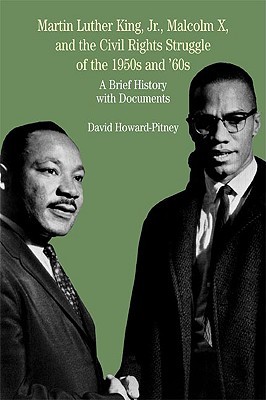
- We will send in 10–14 business days.
- Author: David Howard-Pitney
- Publisher: BEDFORD BOOKS
- ISBN-10: 0312395051
- ISBN-13: 9780312395056
- Format: 14.1 x 20.9 x 1.1 cm, minkšti viršeliai
- Language: English
- SAVE -10% with code: EXTRA
Martin Luther King, Jr., Malcolm X, and the Civil Rights Struggle of the 1950s and 1960s (e-book) (used book) | bookbook.eu
Reviews
Description
The civil rights movement's most prominent leaders, Martin Luther King, Jr. (1929-1968) and Malcolm X (1925-1965), represent two wings of the revolt against racism: nonviolent resistance and revolution "by any means necessary." This volume presents the two leaders' relationship to the civil rights movement beyond a simplified dualism. A rich selection of speeches, essays, and excerpts from Malcolm X's autobiography and King's sermons shows the breadth and range of each man's philosophy, demonstrating their differences, similarities, and evolution over time. Organized into six topical groups, the documents allow students to compare the leaders' views on subjects including integration, the American dream, means of struggle, and opposing racial philosophies. An interpretive introductory essay, chronology, selected bibliography, document headnotes, and questions for consideration provide further pedagogical support.
EXTRA 10 % discount with code: EXTRA
The promotion ends in 23d.15:54:37
The discount code is valid when purchasing from 10 €. Discounts do not stack.
- Author: David Howard-Pitney
- Publisher: BEDFORD BOOKS
- ISBN-10: 0312395051
- ISBN-13: 9780312395056
- Format: 14.1 x 20.9 x 1.1 cm, minkšti viršeliai
- Language: English English
The civil rights movement's most prominent leaders, Martin Luther King, Jr. (1929-1968) and Malcolm X (1925-1965), represent two wings of the revolt against racism: nonviolent resistance and revolution "by any means necessary." This volume presents the two leaders' relationship to the civil rights movement beyond a simplified dualism. A rich selection of speeches, essays, and excerpts from Malcolm X's autobiography and King's sermons shows the breadth and range of each man's philosophy, demonstrating their differences, similarities, and evolution over time. Organized into six topical groups, the documents allow students to compare the leaders' views on subjects including integration, the American dream, means of struggle, and opposing racial philosophies. An interpretive introductory essay, chronology, selected bibliography, document headnotes, and questions for consideration provide further pedagogical support.


Reviews